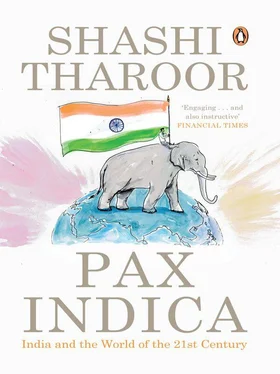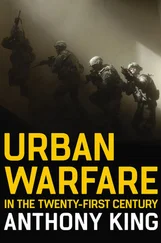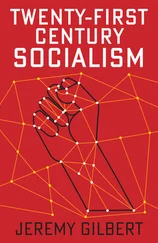While poverty and human insecurity may not be said to ‘cause’ civil war, terrorism or organized crime, they all greatly increase the risk of instability and violence. Catastrophic terrorism against the rich countries can affect the development prospects of millions in poor countries by causing a major economic downturn or forcing developed nations to focus on their own concerns. So global security can be said to rest in the creation of a kind of global order that responds to both hard and soft threats, and that does so through a network of states sharing common values and compatible approaches to governance. In this sense I would argue that India has a stake in such a world order, and that it also seeks to be the kind of society that ensures the safety and well-being of its citizens with full respect for their human rights, their basic needs and their physical security.
Across the globe, the threats to peace and security in the twenty-first century include not just international war and conflict but also civil war and internal violence, the insidious depredations of organized crime, the virulent menace of terrorism and the risks posed by weapons of mass destruction. And the threats facing the globe also include the scourges of poverty, of famine, of illiteracy, of deadly disease, of the lack of clean drinking water, of environmental degradation, of injustice, and of human insecurity. All of these threats make human beings less secure; they also undermine states and make them less secure.
Both within countries and across our globalized world, the threats we face are interconnected. The rich are vulnerable to the threats that attack the poor and, paradoxical as it may sound, the strong are vulnerable to the sufferings of the weak. Former UN Secretary-General Kofi Annan famously called for a new global security consensus based on the interconnectedness of such threats. ‘A nuclear terrorist attack on the United States or Europe would have devastating effects on the whole world,’ he wrote. ‘But so would the appearance of a new virulent pandemic disease in a poor country with no effective health-care system. We must respond to HIV/AIDS as robustly as we do to terrorism,’ he added, ‘and to poverty as effectively as we do to proliferation.’ In India as well, we need to tackle the same range of threats if we are to keep our people secure.
The world has clearly evolved since the era when the Cold War seemed frozen in place, borders seemed immutable, and the Soviet Union looked as if it would last forever. In the same vein, the new threats we have to deal with require new responses from the international system, for which new ways of cooperation may need to be devised.
Human security requires a world in which sovereign states can come together to share burdens, address common problems and seize common opportunities. If we are determined to live in a world governed by global rules and shared values, we must strengthen and reform the multilateral institutions that the enlightened leaders of the last century have bequeathed to us. In this interconnected world, we need an effective and representative United Nations, in all our interests. And as one who was once the Indian candidate for the secretary-generalship, I trust I will be forgiven for quoting Mahatma Gandhi, who famously said, ‘You must be the change you wish to see in the world.’ The UN is no exception. To change the world, the UN must change too.
I am convinced there is much that can be accomplished with the UN as the lynchpin of our system of global governance. I am not advocating world government; we all know that such an idea would be deeply unwelcome in many places, and is neither practical nor desirable in today’s world. India is not alone in being proud of its sovereignty and unwilling to dilute it. But India has every interest in helping devise laws and norms in collaboration with other countries, and agreeing to uphold them as the ‘rules of the road’ for the global commons. And it is in India’s interests to help maintain a forum where sovereign states can come together to do this.
So much for the architecture. But, as the old saying goes, a house is not a home. Something more — something extremely important, although not quite so tangible — is needed: the new UN must encapsulate the twenty-first century’s equivalent of the spirit that informed its founding. It must amplify the voices of those who would otherwise not be heard, and serve as a canopy beneath which all can feel secure. The UN is, and must continue to be, a forum where the rich and powerful can commit their strength and their wealth to the cause of a better world. And it must continue to provide the stage where great and proud nations, big and small, rich and poor, can meet as equals to iron out their differences and find common cause in their shared humanity. The India of Mahatma Gandhi and Jawaharlal Nehru can certainly strive to ensure that the UN of the twenty-first century never forgets that it is both a child and a source of hopes for a better world — hopes that all human beings share. This is the only UN we have to help surmount the challenges posed by our shared space in the twenty-first century, and we need to do our best in India to ensure our rightful place in it — to ensure that it does the right thing and that it does the thing right.

What sort of role does India need and expect to play on global issues in the second decade of the twenty-first century, and beyond?
When India was elected (by record margin) to a non-permanent seat on the Security Council for the term 2011–12, it joined an unusually heavyweight set of countries. Germany and South Africa were elected at the same time, while Brazil and Nigeria were halfway through their two-year terms as non-permanent members. This also meant that, unusually, four international groupings were found on the Council in 2011: RIC, the Russia — India — China triumvirate that meets twice a year at foreign minister level; BRIC, which adds Brazil to the list and which became BRICS with the later incorporation of South Africa; IBSA, the India— Brazil — South African alliance of the three largest southern hemisphere powers; and BASIC, which brought Brazil, South Africa, India and China together during the climate change negotiations in Copenhagen in 2009. Interestingly enough, the only country that belongs to all four is India — a pointer to the extent to which India has become a fulcrum in global politics.
It also hinted at a larger and more important change in global politics. Half the members of the G20, the grouping that is now the world’s premier forum on international economic questions, were serving on the Council, dealing with issues of peace and security. The ‘permanent five’ (P5) countries — the United States, Britain, France, China and Russia — that had become accustomed, in recent years, to arriving at deals among themselves and more or less imposing them on the ten non-permanent members, suddenly discovered that this was not possible with the five big ones, that expected to be consulted and whose acquiescence on key questions could not be assumed (as several of them showed by dissenting, for instance, over Libya, Syria and Iran). At the same time, the performance of the aspirant countries on the Council was described in Washington as if it were a job interview for the possible permanent seat, their ‘responsible behaviour’ (or lack thereof) as a harbinger of what is to come if and when they receive permanent status.
Whether this cramped India’s style or not, it took itself seriously on the Council, surprised some observers by signing up to the West’s key resolutions on Libya and Syria while opposing others, and responsibly chaired the Council’s Counter-Terrorism Committee. India did not hesitate, in its first year on the Security Council, to argue the classic outsider’s case for its transformation. As Foreign Minister S.M. Krishna declared, ‘The international structure for maintaining peace and security and peacebuilding needs to be reformed. Global power and the capacities to address problems are much more dispersed than they were six decades ago. The current framework must address these realities.’ But in almost the same breath he went on to assure the big powers that India would not challenge their major interests: ‘We understand the expectations that accompany our Council membership. We are acutely conscious of the need for effective coordination between the P5 and the elected members, especially those whose credentials for permanent membership stand acknowledged. On issues concerning international peace and security, all of us are on the same page.’
Читать дальше













